走遍美国 UNIT 9
- 格式:ppt
- 大小:5.54 MB
- 文档页数:46
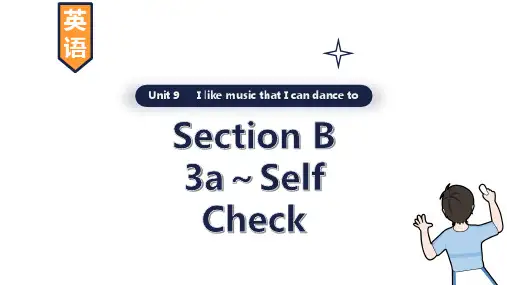
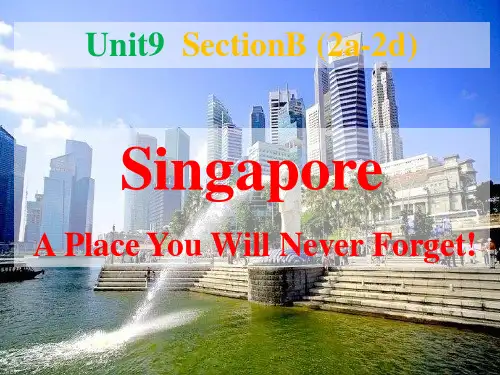
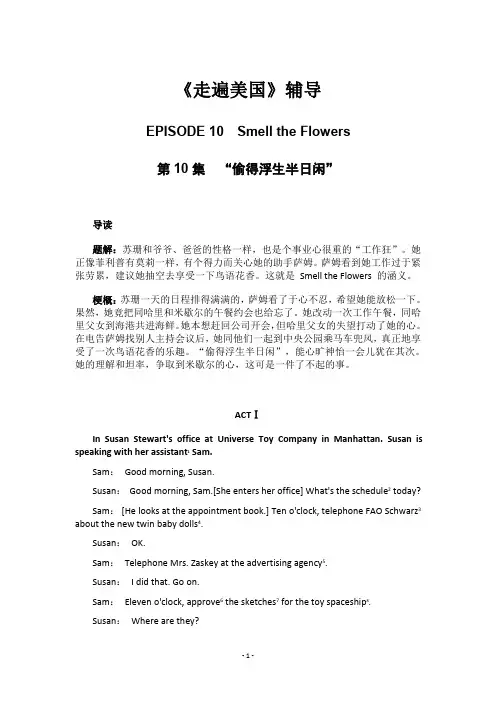
《走遍美国》辅导EPISODE10Smell the Flowers第10集“偷得浮生半日闲”导读题解:苏珊和爷爷、爸爸的性格一样,也是个事业心很重的“工作狂”。
她正像菲利普有莫莉一样,有个得力而关心她的助手萨姆。
萨姆看到她工作过于紧张劳累,建议她抽空去享受一下鸟语花香。
这就是Smell the Flowers的涵义。
梗概:苏珊一天的日程排得满满的,萨姆看了于心不忍,希望她能放松一下。
果然,她竟把同哈里和米歇尔的午餐约会也给忘了。
她改动一次工作午餐,同哈里父女到海港共进海鲜。
她本想赶回公司开会,但哈里父女的失望打动了她的心。
在电告萨姆找别人主持会议后,她同他们一起到中央公园乘马车兜风,真正地享受了一次鸟语花香的乐趣。
“偷得浮生半日闲”,能心旷神怡一会儿犹在其次。
她的理解和坦率,争取到米歇尔的心,这可是一件了不起的事。
ACTⅠIn Susan Stewart's office at Universe Toy Company in Manhattan.Susan is speaking with her assistant1Sam.Sam:Good morning,Susan.Susan:Good morning,Sam.[She enters her office]What's the schedule2today?Sam:[He looks at the appointment book.]Ten o'clock,telephone FAO Schwarz3 about the new twin baby dolls4.Susan:OK.Sam:Telephone Mrs.Zaskey at the advertising agency5.Susan:I did that.Go on.Sam:Eleven o'clock,approve6the sketches7for the toy spaceship8.Susan:Where are they?Sam:Right here.Susan:Did you look at them?Sam:Yes,I did.Susan:What do you think of the spaceship?Sam:I think the kids'll love it.Susan:Would you show me the drawings9,please?[Sam gives a sketch of a toy spaceship to Susan.]Susan:Huh.[She examines10the drawing.]A little later…Susan:Now,what else is on the schedule today?Sam:Well,at one o'clock you have a lunch appointment with Mr.Levine,the client11from the Toytown Stores.Susan:Where?Sam:At Rossano's.Susan:Hmm.Anything else?Sam:At four o'clock,you have a meeting with the production staff12in the conference room13.Susan:Make sure everybody is at that meeting.Sam:Will do.14At six you're meeting Mr.Ozawa.Susan:Oh,yes.Are his models15here?Sam:They're in my office.Susan:I'd like to see them.Sam:Right.16Susan:What else?[Sam drops the appointment book and pencil on Susan's desk.]Susan:Come on,Sam…Sam:You work too hard,Susan.When was your last day off?Susan:Hmm.I can't remember.Sam:You really ought to17take some time off.Susan:What for?18Sam:To enjoy the simple things in life (19)Susan:I know,Sam.Maybe soon.Sam:To smell the flowers20.Susan:Oh,wait a minute.What's today's date?Sam:Today is the twelfth21.Why?Susan:It seems to me I scheduled something else.Sam:There's nothing else in the appointment book.Susan:I'm sure I did.Oh,well,I'll probably22remember it later.Sam:I hope it isn't important.Susan:Hmm.It's probably nothing.OK,let's get started.Would you call Priscilla Smith at FAO Schwarz,please?Sam:Right.Later that morning…Sam:[He holds two model cars.]These are the models from the Japanese film maker23.Susan:Thank you.Just put them on my desk.Sam:And the new drawings for the toy spaceship.Susan:Wonderful.That was fast.Sam:We have a new artist.She's very talented24.Susan:What time is it,anyway?My watch stopped.Sam:It's eleven thirty25.Susan:What time is my lunch date with Bill Levine?Sam:One o'clock.Susan:Remind me to leave at twelve forty-five26.Sam:Did you remember your other appointment for today?Susan:No,but I have a feeling27it's going to be too late when I do remember.[Sam leaves Susan's office.A little later,he returns.]Susan:Yes,Sam?Sam:I just solved the mystery28.Susan:What did I forget?Sam:You have some guests in the reception room29.Susan:What?Who?Sam:Mr.Harry Bennett and his daughter.Susan:I remember!Oh…Harry!I made a lunch date with him and his daughter weeks ago.Sam:Is he a client?Susan:He's a friend.Sam:Well he's here with his daughter to have lunch.Susan:I met her at Thanksgiving,and I promised to have lunch with both of them today.Sam:Yes,indeed.What are you going to do about your appointment with Mr. Levine?Susan:Any suggestions?[She smiles at Sam.]oh!ACTⅡIn the reception room of Susan's office.Susan greets Harry and Michelle.Susan:Hi,Michelle.Hello,Harry.It's nice to see you again.Michelle:Hello.Harry:Hi,Susan.We have both been excited about seeing you and having lunch with you today.[He hands Susan a bouquet1of flowers.]Michelle picked these flowers out2for you.Michelle:Daddy,can we go soon?Harry:We're going to go to lunch in a few minutes,honey.Michelle:But I'm thirsty3.Harry:OK.You go out and get a drink of water at the fountain4.Susan:[pointing]The fountain is over there,Michelle.Near the Exit5sign6.Michelle:Thank you.Harry:Michelle is a little shy7.Susan:I used to8be that way when I was her age.Harry,if Micholle doesn't want to go,we don't have to.Harry:She'll be fine.Remember,I haven't dated anyone else since her mother died.This is a little difficult for her.Are you ready to go?Susan:Yes.But could you wait one minute?I have a call to make.Would you excuse me?[She goes into her office.Sam is there.]Sam,get Mr.Levine at Toytown Stores on the telephone for me,please.Sam:Right.[He dials.]Hello.Susan Stewart calling Mr.Levine,please.[to Susan] He's on the phone.[He hands her the telephone.]Susan:Mr.Levine,Susan Stewart.I find myself in an embarrassing9situation.I made another lunch date for today and forgot to enter10it in my appointment book. Can you and I meet for drinks tomorrow?I'd really appreciate11it…Yes…Thank you…Tomorrow at five o'clock at the Biltmore12.I'll see you then.Thank you,Mr. Levine.[She hangs up.]At the South Street Seaport13later that afternoon.Waiter:Welcome to the South Street Restaurant14,folks.What'll it be?15Harry:What do you recommend16?Waiter:Well,the crab17salad's always a big hit18.Harry:Susan,would you like the crab salad?Susan:I'd love the crab salad.Harry:Michelle,would you like to try the crab salad,too?Michelle:OK,Daddy.Harry:We'll have the three crab salads and a pitcher19of lemonade20.Waiter:Help yourself to21celery22and carrots23and other vegetables.Harry:[to Susan]We used to catch crabs.Susan:Where was that?Harry:We had a summer house on Fire Island24.Do you remember,Michelle?Michelle:Sure.You and Mommy used to take me on the ferryboat25.Harry:Sometimes,at night,we would go26down to the beach27and catch crabs, remember?Michelle:With a piece of meat on a string!28Harry:Right.Well,I think I'm going to get us all some vegetables.[Harry leaves the table.The waiter arrives and sets down their food.]Waiter:There you go.29Susan:Thank you.Waiter:And some ice-cold30lemonade.Susan:Thank you.Waiter:Enjoy it.Susan:Michelle,can I help you with the lemonade?Michelle:No,thank you.I'll wait for my father.Susan:Michelle,can we have a talk?Michelle:Sure.Susan:I know you miss your mother.Michelle:You do?Susan:Yes,And I'm not trying to take her place31.Michelle:Then why are you and Daddy spending so much time together?Susan:Because we like each other.And right now,he needs a friend.Michelle:I'm his friend.Susan:I know you are.Michelle:Sometimes he's very sad.Susan:And so are you,I think.Michelle:Sometimes.Susan:I'd like to be your friend,too.Will you let me be your friend,Michelle?[She offers her hand to Michelle.32Michelle accepts it.]Harry:[He returns to the table.]So,what were you two talking about?Michelle:Just girl talk33,Daddy.It's too hard to explain.Harry:You're probably right.Well,let's get started.[They begin to eat.]ACTⅢAt the South Street Seaport a little later.Susan,Harry,and Michelle are sightseeing1.Susan:[She look at her watch.]Oh,it's a quarter to four,and I have a production meeting at four.Harry:I planned to take you for a ride2in Central Park3in a horse and carriage4.Susan:Harry,I'd love to,but I have work to do.Harry:OK,We'll walk back to your office with you.It's so nice out.5I decided to forget about my accounting6problems7and just enjoy this beautiful spring day. Take the time,Susan.Susan:I know I should,but…well,there are too many things to do.Harry:I understand.I'll go for a ride with Michelle.Susan:Right.Well,I had a really nice time.Harry:So did I.8Michelle:So did I.I'm sorry you can't come with us,Susan.Susan:So am I.Harry:Bye-bye.[He and Michelle start to leave.]Susan:Harry!Michelle!Can you wait till I make a phone call?Harry:Sure.[Susan calls her office from a pay phone9.]Sam:Susan Stewart's office.Susan:Sam,this is Susan.Sam:Hi.How was lunch?Susan:Fine.Sam:You're late.The production department's waiting in the conference room.Susan:I know.Ask Paul Smith to fill in for me10.He knows everything about the production schedule,and he can answer any questions11.Sam:Right.Susan:Don't tell anyone,but I'm taking a little time to smell the flowers.Sam:Good for you.12It'll be our secret13.Susan:But schedule another production meeting for tomorrow.I'll be back for my six o'clock appointment with Mr.Ozawa.Sam:OK,Susan.And have a nice afternoon.Susan:Thanks.[She hangs up the phone and joins Harry and Michelle.They get into a taxicab14.]Later,in Central Park.Harry,Susan,and Michelle are riding in a carriage.Harry:She likes you.Susan:I know.I like her.Harry:How'd you do it?Susan:We had a talk.Harry:About what?Susan:Life.Harry:And what did you decide15?Susan:That's a secret…between us women.[The carriage continues16to ride through Central Park.]第一幕语言重点:*动词show的用法:show someone,show something,show someone something,show something to someone,show someone+像介词的副词,show+that 从句或how从句等。

Lesson 10 第10课EPISODE 1 46 Linden Street 林登大街46号ACT 2PART 4Hello. 你好。
Yes. The number, please, of the Staten Island Ferry lost-and-found office. Staten你好。
我想问一下Staten Island渡轮失物招领处的电话号码。
Staten. Five five five...zero eight zero eight.Staten。
555...0808。
Thank you. 谢谢。
I really appreciate it, Marilyn. 真的很感谢,Marilyn。
Hello.你好。
Did anyone find a camera bag this afternoon, a small canvas bag, on the J. F. Kennedy Ferry? ...No?请问今天下午有人捡到一个照像机旅行袋,一个小的粗帆布袋?是在J. F. Kennedy渡轮上丢的。
……没有吗?Maybe someone will find it. 也许会有人发现的。
The name is Stewart, Richard Stewart. 失主是Stewart ,Richard Stewart。
And the telephone number is five five five... three oh nine oh. Thank you.电话是555......3090。
谢谢。
Sorry, Richard. They don't have it. 对不起,Richard。
他们那儿没有。
Thanks, anyway. 不管怎样,我都得谢谢你。
There was a girl on the ferry. 在码头上有一个女孩。
Now maybe... 也许现在……Tell me about it on the way home. 在回家的路上告诉我吧。
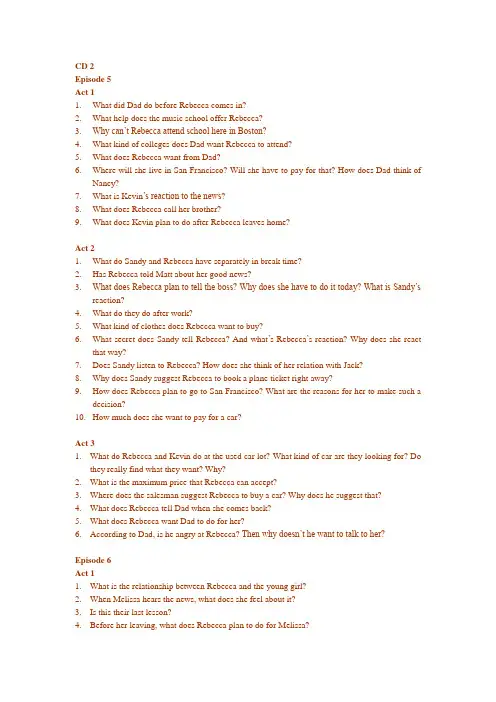
CD 2Episode 5Act 11.What did Dad do before Rebecca comes in?2.What help does the music school offer Rebecca?3.Why can’t Rebecca attend school here in Boston?4.What kind of colleges does Dad want Rebecca to attend?5.What does Rebecca want from Dad?6.Where will she live in San Francisco? Will she have to pay for that? How does Dad think ofNancy?7.What is Kevin’s reaction to the news?8.What does Rebecca call her brother?9.What does Kevin plan to do after Rebecca leaves home?Act 21.What do Sandy and Rebecca have separately in break time?2.Has Rebecca told Matt about her good news?3.What does Rebecca plan to tell the boss? Why does she have to do it today? What is Sandy’sreaction?4.What do they do after work?5.What kind of clothes does Rebecca want to buy?6.What secret does Sandy tell Rebecca? And what’s Rebecca’s reaction? Why does she reactthat way?7.Does Sandy listen to Rebecca? How does she think of her relation with Jack?8.Why does Sandy suggest Rebecca to book a plane ticket right away?9.How does Rebecca plan to go to San Francisco? What are the reasons for her to make such adecision?10.How much does she want to pay for a car?Act 31.What do Rebecca and Kevin do at the used car lot? What kind of car are they looking for? Dothey really find what they want? Why?2.What is the maximum price that Rebecca can accept?3.Where does the salesman suggest Rebecca to buy a car? Why does he suggest that?4.What does Rebecca tell Dad when she comes back?5.What does Rebecca want Dad to do for her?6.According to Dad, is he angry at Rebecca? Then why doesn’t he want to talk to her?Episode 6Act 11.What is the relationship between Rebecca and the young girl?2.When Melissa hears the news, what does she feel about it?3.Is this their last lesson?4.Before her leaving, what does Rebecca plan to do for Melissa?5.What do they play at the class?Act 21.Why does Dad come to the used car lot with his friend Frank? How does Frank feel aboutDad’s buying a car for Rebecca?2.What does Frank think of Rebecca’s idea of driving to San Francisco alone?3.What does Frank think of going to a music school? What does he suggest Dad to do?4.What is Dad’s attitude to Rebecca’s plan now? Has he changed his view? Has he given up?5.What are the shortcomings of the car that Frank advises Dad to buy?6.Do they decide to buy it? What will they do before Dad pays?Act 31.Who go to watch Rebecca play baseball?2.What is the final score?3.What do Sandy think of the reasons for they to lose the game?4.What will Rebecca and Kevin arrange to do tomorrow?5.What does Rebecca invite Sandy to do? Why does Sandy decline the invitation?6.What does the team send Rebecca as a gift?7.Did the team win a lot games?8.What has Matt expected for their relationship?9.What is Matt’s decision about their relationship? Why?VocabularyUnit 5Act 11.no way: by no mean 决不,没门儿2.pal(informal): friende.g. We’ve been pals for years.Act 21.get zilch (informal): get nothing2.period: that is final 到此为止,就这样Act 31.gotcha: I understand what you are trying to say2.count on :rely one.g.Y ou can count on my help.Unit 6Act 11.the blues: slow melancholy jazz music originating among Blacks in the southern USA布鲁斯音乐,蓝调音乐Act 21.sb. is nuts: sb. is crazy2.pay off: bring good result; be successful3.Y ou’re telling me: I completely agree with you.这还用你说;我早知道4.she is fired up about that idea: she crazy about that idea5.make sense: have an understandable meaning6.get ripped off: get cheated financially受骗Act 31.stingy: (informal) mean; giving unwillingly小气e.g. He tried to save money without being stingy.他要设法能省钱而又不流于吝啬。
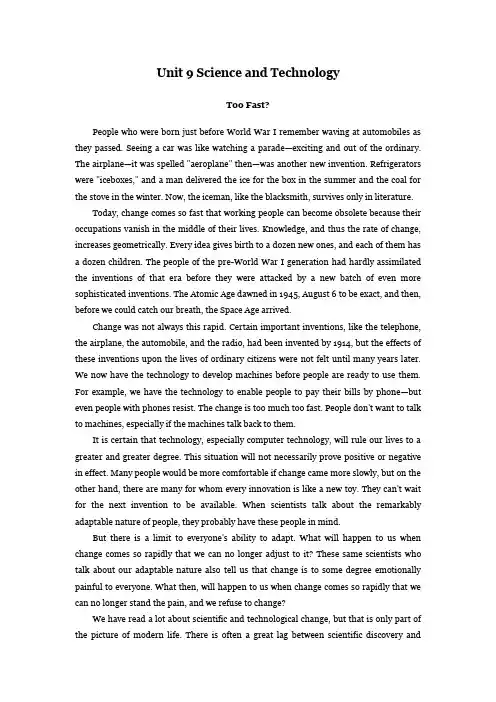
Unit 9 Science and TechnologyToo Fast?People who were born just before World War I remember waving at automobiles as they passed. Seeing a car was like watching a parade—exciting and out of the ordinary. The airplane—it was spelled "aeroplane" then—was another new invention. Refrigerators were "iceboxes," and a man delivered the ice for the box in the summer and the coal for the stove in the winter. Now, the iceman, like the blacksmith, survives only in literature.Today, change comes so fast that working people can become obsolete because their occupations vanish in the middle of their lives. Knowledge, and thus the rate of change, increases geometrically. Every idea gives birth to a dozen new ones, and each of them has a dozen children. The people of the pre-World War I generation had hardly assimilated the inventions of that era before they were attacked by a new batch of even more sophisticated inventions. The Atomic Age dawned in 1945, August 6 to be exact, and then, before we could catch our breath, the Space Age arrived.Change was not always this rapid. Certain important inventions, like the telephone, the airplane, the automobile, and the radio, had been invented by 1914, but the effects of these inventions upon the lives of ordinary citizens were not felt until many years later. We now have the technology to develop machines before people are ready to use them. For example, we have the technology to enable people to pay their bills by phone—but even people with phones resist. The change is too much too fast. People don't want to talk to machines, especially if the machines talk back to them.It is certain that technology, especially computer technology, will rule our lives to a greater and greater degree. This situation will not necessarily prove positive or negative in effect. Many people would be more comfortable if change came more slowly, but on the other hand, there are many for whom every innovation is like a new toy. They can't wait for the next invention to be available. When scientists talk about the remarkably adaptable nature of people, they probably have these people in mind.But there is a limit to everyone's ability to adapt. What will happen to us when change comes so rapidly that we can no longer adjust to it? These same scientists who talk about our adaptable nature also tell us that change is to some degree emotionally painful to everyone. What then, will happen to us when change comes so rapidly that we can no longer stand the pain, and we refuse to change?We have read a lot about scientific and technological change, but that is only part of the picture of modern life. There is often a great lag between scientific discovery andcultural acceptance. For example, Charles Darwin's theory of evolution, proposed over one hundred years ago and accepted by all serious scholars for generations, is still rejected by large segments of society. These segments see science as contradicting a higher religious authority. They see science as questioning and destroying their beliefs and culture.The problem is not easily solved because it is in the nature of science to question, and it is in the nature of human beings not to want to question the things they believe in. Science is not merely a field of study like chemistry or physics or biology. Science is a method of looking at the world, a method that requires an open mind, objectivity, and proof based upon observation or experimentation. It is a method that ignores religion, race, nationality, economics, morality, and ethics. It pays attention only to the results of research. The scientific method has shown us endless marvels and wonders, but methods can't provide all the answers. Science cannot tell us whether or not to drop a bomb: That is a moral or political question. Science only tells us how to make one.As we have already said, technological innovations are being made at faster and faster rates. The future will be even more revolutionary than the past. Will we, as a species, survive the revolutions that we have begun? There is plenty of evidence to think that we will. Our species has enormous potential that we have just begun to use. For example, we have only begun to control the environment. One day technology will make every desert bloom. It's simple, really. To do so, all we need to do is lower the cost of converting sea water into fresh water. Then, when the deserts bloom, will they provide enough food for our growing numbers? Most likely, they will. We have only just begun to discover the possibilities of highly intensive desert agriculture. We already have the technology to increase production ten times and to use one-twentieth of the water we needed before.We know how to make agricultural miracles. What we need are the time and money to make the technology available to everyone.In the nineteenth century, people believed in progress. They believed that science would lead them to a new era of endless prosperity and happiness. Well, it didn't work out that way. Two disastrous world wars convinced people of that. Yet, in our disappointment and in our fears that science was a monster that would one day destroy us, we forgot that science was not the monster; we were the monster. Science was merely a servant, and like fire, a good servant when treated properly.Despite all the problems of the modern world, however, most people would not choose to live in any of the less scientific ages that have preceded ours. If—and this is abig if—we don't destroy ourselves in war, the future can only be better. Each year will bring a more bewildering array of scientific advances: diseases cured, space conquered, transportation and communication revolutionized, agriculture and industry completely transformed, etc. To some, the future sounds exciting; to others, frightening. But one thing is sure—it won't be boring.太快了?1 在第一次世界大战前夕出生的人仍然记得看到身边经过的汽车就挥手的情景。
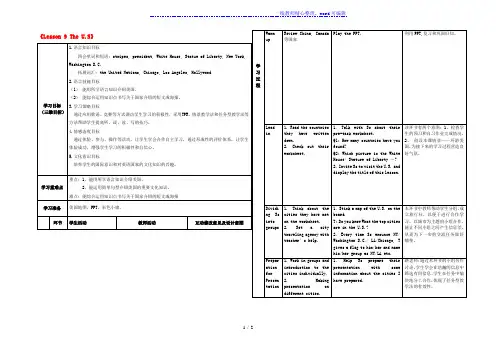
1. Give presentations about their task city and insert a flag on the map.2. The audience can ask for the messages they want to know. 1. Listen to their presentation.T: We know there are severalfamous cities in the U.S. Nowlet’s get some ideas. WelcomeGroup One.2. Help each group insert a flagon the map on the board.路老师:本环节旨在让学生综合运用知识结构对本组城市进行描述,提高口头表达能力。
同时,学生在聆听后通过提问获得更多信息。
Assess ment The best group willget thecertification.1. Give assessment to each group.2. Give certification to the besttraveling agency.T: You have done a very good job,children. I think Group X is thebest one, so I choose to visitthis city.路老师:对学生的旅游解说进行简短点评,有利于学生及时总结和反馈所学知识。
教师的点评能让紧张的课堂节奏稍微放缓,有利于下一步的学习。
Post-t ask Dubbin g Listen to the video. Ask the Ss to listen to the tapeand dub the text.听纯正发音能让学生增加语言输入,又能在模仿配音当中锤炼自己的语音语调。
板书设计Lesson 9 The U.S. Check Ss’reading.通过展示读课文,分享学习的快乐。
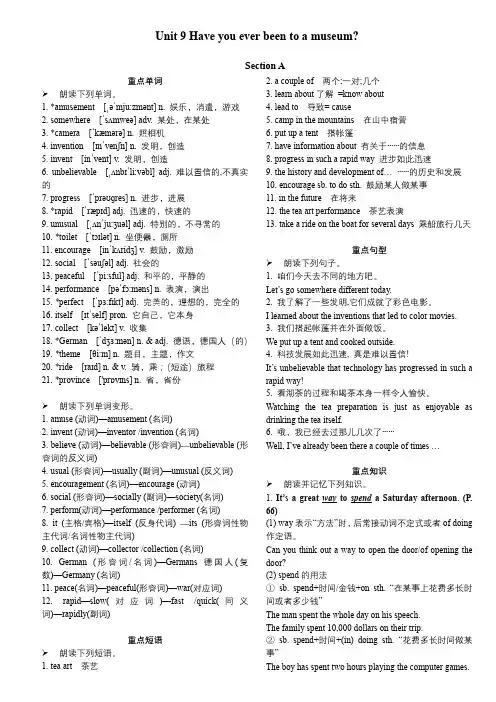
Unit 9 Have you ever been to a museum?Section A重点单词➢朗读下列单词。
1. *amusement [ˌəˈmju:zmənt] n. 娱乐,消遣,游戏2. somewhere [ˈsʌmweə] adv. 某处,在某处3. *camera [ˈkæmərə] n. 照相机4. invention [ɪnˈvenʃn] n. 发明,创造5. invent [inˈvent] v. 发明,创造6. unbelievable [ˌʌnbɪˈli:vəbl] adj. 难以置信的,不真实的7. progress [ˈprəʊɡres] n. 进步,进展8. *rapid [ˈræpɪd] adj. 迅速的,快速的9. unusual [ˌʌnˈju:ʒuəl] adj. 特别的,不寻常的10. *toilet [ˈtɔɪlət] n. 坐便器,厕所11. encourage [inˈkʌridʒ] v. 鼓励,激励12. social [ˈsəuʃəl] adj. 社会的13. peaceful [ˈpi:sful] adj. 和平的,平静的14. performance [pəˈfɔ:məns] n. 表演,演出15. *perfect [ˈpɜ:fɪkt] adj. 完美的,理想的,完全的16. itself [ɪtˈself] pron. 它自己,它本身17. collect [kəˈlekt] v. 收集18. *German [ˈdʒɜ:mən] n. & adj. 德语,德国人(的)19. *theme [θi:m] n. 题目,主题,作文20. *ride [raɪd] n. & v. 骑,乘;(短途)旅程21. *province ['prɒvɪns] n. 省,省份➢朗读下列单词变形。
1. amuse (动词)—amusement (名词)2. invent (动词)—inventor /invention (名词)3. believe (动词)—believable (形容词)—unbelievable (形容词的反义词)4. usual (形容词)—usually (副词)—unusual (反义词)5. encouragement (名词)—encourage (动词)6. social (形容词)—socially (副词)—society(名词)7. perform(动词)—performance /performer (名词)8. it (主格/宾格)—itself (反身代词) —its (形容词性物主代词/名词性物主代词)9. collect (动词)—collector /collection (名词)10. German (形容词/名词)—Germans 德国人(复数)—Germany (名词)11. peace(名词)—peaceful(形容词)—war(对应词)12. rapid—slow(对应词)—fast /quick(同义词)—rapidly(副词)重点短语➢朗读下列短语。
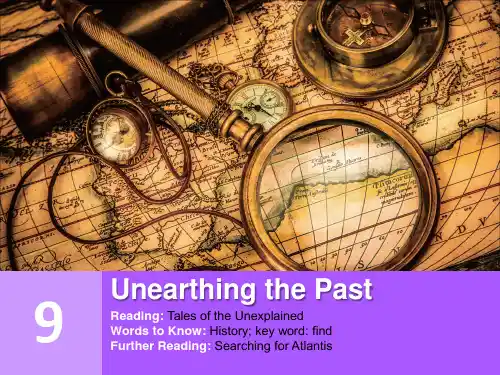
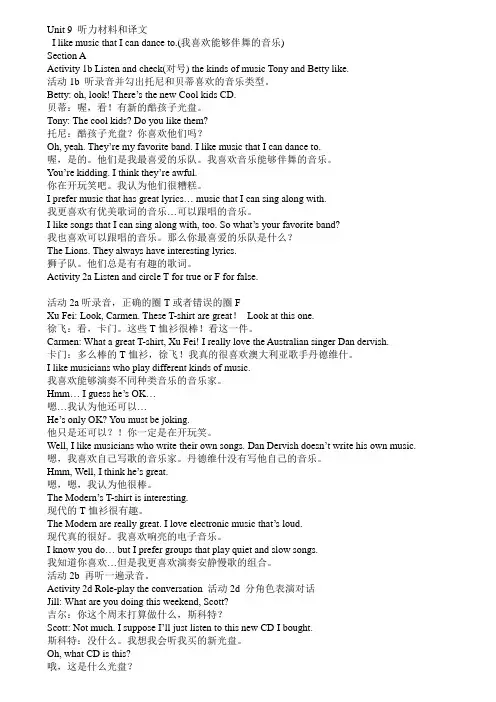
Unit 9 听力材料和译文I like music that I can dance to.(我喜欢能够伴舞的音乐)Section AActivity 1b Listen and check(对号) the kinds of music Tony and Betty like.活动1b 听录音并勾出托尼和贝蒂喜欢的音乐类型。
Betty: oh, look! There’s the new Cool kids CD.贝蒂:喔,看!有新的酷孩子光盘。
Tony: The cool kids? Do you like them?托尼:酷孩子光盘?你喜欢他们吗?Oh, yeah. They’re my favorite band. I like music that I can dance to.喔,是的。
他们是我最喜爱的乐队。
我喜欢音乐能够伴舞的音乐。
You’re kidding. I think they’re awful.你在开玩笑吧。
我认为他们很糟糕。
I prefer music that has great lyrics… music that I can sing along with.我更喜欢有优美歌词的音乐…可以跟唱的音乐。
I like songs that I can sing along with, too. So what’s your favorite band?我也喜欢可以跟唱的音乐。
那么你最喜爱的乐队是什么?The Lions. They always have interesting lyrics.狮子队。
他们总是有有趣的歌词。
Activity 2a Listen and circle T for true or F for false.活动2a听录音,正确的圈T或者错误的圈FXu Fei: Look, Carmen. These T-shirt are great!Look at this one.徐飞:看,卡门。
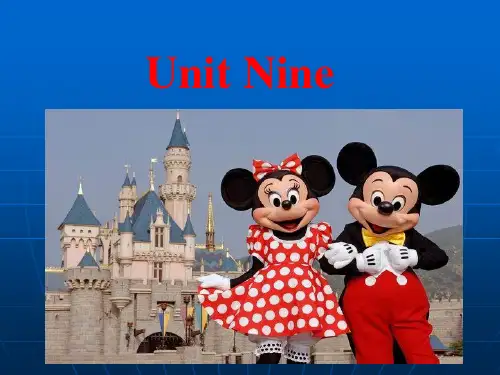
《英语口语》课程教学大纲一、课程性质及与其它课程的分工与联系1、课程性质本课程属专业基础课程,是《商务英语交际》和《商务英语口译》课程的先开课程。
2、先修课程《英语语音技巧》、《英语语法》、《英语听力》二、课程目标与基本要求1、课程目标本课程的教学目的是通过大量的口语练习和实践,逐步培养提高学生的口头交际能力,使学生不仅能听懂日常和商务英语会话,能以准确的语调进行英语会话,自由地表达自己的思想和观点,而且能逐步养成用符合特定场合的得体语言回答或者提出各种问题的习惯,为今后工作做好充分的准备。
2、基本要求本课程教学安排为两学年,共128课时,分四个学期完成。
第一学年着重培养学生在日常生活中的交际能力和叙述能力。
第二学年着重培养学生就社会生活和商务话题进行交谈和连贯表达的能力。
对学生在各个学期的口语能力具体要求如下:1)通过第一学期的学习,学生应能运用简单的日常英语进行对话,并能就所听、读的材料回答问题及复述,做到语音、语调、语法基本正确。
2)通过第二学期的学习,学生应能就一般日常生活话题进行简单的交谈;能就熟悉的话题经一定的准备后,作1-2分钟的连贯性发言。
3)通过第三学期的学习,学生应能经一定准备后, 就一般日常生活和社会生活话题作3-5分钟的连贯性发言和交谈。
4)通过第四学期的学习,学生应能就熟悉的话题略作准备后作3-5分钟的连贯性发言;能就日常生活和社会生活和商务话题同英语国家人士交谈;能比较准确地表达思想,语言基本得体。
三、教学内容与体系本课程采用高等教育出版社出版的《新编商务英语口语》,共四册。
教材第一册主要为各种日常对话,对话的地点在国内,背景则是中国学生所熟悉的各种口语交际场所。
内容主要涉及介绍相识、打电话、谈论天气、邀请聚会、用餐、购物、看病、吉庆假日、娱乐和体育运动等日常领域中的用语。
从第二册起,部分对话的地点和背景将移向国外。
这种结构安排使学生对背景知识从“熟悉”到“不熟悉”,从而使英语学习得以循序渐进。
Unit 91) recruit recruit 2) has thrown herself into 3) reality 4) contrast5) transport 6) additional 7) make concessions 8) be kept secret/ be kept a secret9) dissolve 10) theme 11) in honor of 12) overflowed1) is stuffed/ is often stuffed 2) turn a blind eye to 3) Scarcely 4)handful5)upset 6)have access to 7)bound for 8)confess 9)made a name for himself10)swell 11)in tune 12)striking1) lived through/ had lived through 2) is running out 3) turn out4) brought back 5) call up 6) for paid 7) think up 8) sent off 9) took in10) figure out1)technician 2)composer 3)survivor 4)painter 5)waiter/waitress 6)engineer7)New Yorker 8)mountaineer 9)pianist 10)Italian 11)tourist 12)prisoner 13)electrician 14)European 15)beggar 16)investor 17)singer 18)liar2.Study the following words, and then explain how they are formed, what the commonly shared element is and what it means:略1) unless they are doing damage2) unless the pay is too low/ if the pay is not too low3) if I didn't have this cold4) unless it rains5) unless there's a plane strike/ a strike at the airport6) unless you're too tired/ if you're not too tired7) unless she changed her mind8) if he doesn't have an accident soon1) Pupils went on the outing as planned despite the rain.2) Despite a thorough search in the mountain, no trace of the missing climber has been found.3) John still managed to eat a huge lunch despite having had a snack less than an hour before.4) Despite repeated assurances that the product is safe, most people have stopped buying it.5) He went to work as usual despite the fact that his doctor had told him to rest.1) Since you're in charge2) Since I've read this novel3) Since the decision has been made4) Since you have learned the rules5) Since I have retired1) These musical instruments were believed to be made in Asia Minor in the fifteenth century.2) Their government is said to be sending two representatives to the regional conference to be held in Bangkok next month.3) The death toll from the earthquake is reported to have risen to five thousand or more4) The blackout in a busy section of the town last night is said to have resulted from a terrorist attack .5) Emma is thought to have made a serious mistake by refusing to reach a compromise with her opponents.1)in contrast 2)reality 3)Amid 4)stage 5)threw themselves into6)kept a secret 7)additional 8)instrument 9)triumph 10)audience11)swelled 12)passion 13)pay for1)how 2)got 3)women 4)ordered 5)an 6)who 7)had 8)these9)said 10)from 11)with 12)hand 13)no 14)hair 15)a 16)it 17)delight18)tears 19)At 20)there 21)later 22)found 23)on 24)still 25)lifting26)heads 27)alive 28)full 29)contained 30)did 31)at 32)feet 33)smokingDictationThe Terezin concentration camp was established by the Nazis in an 18th century fortress in Czechoslovakia on November 24, 1941. More than 150,000 Jews passed through the camp during its four-year existence, which was used as a holding area for eventual murder in Auschwitz. By 1943, rumors began circulating in the international community that the Nazis were exterminating Jews in gas chambers, and that the conditions of the concentration camps did not permit survival. The Nazis rebuilt parts of this camp to serve as a "showpiece" for propaganda purposes. Flowers were planted there. Shops, schools, and a cafe were built. When an investigating commission of the International Red Cross came to visit, they did not see a typical concentration camp. In July 1944 the Nazis made a documentary propaganda film about life in this camp. After the movie was completed, most of the Jewish "actors" were shipped to their death at Auschwitz.翻译今年三月初的一个美好夜晚,我和我的家人到上海大剧院(Shanghai Grand Theater)看著名的音乐剧(musical)《剧院魅影》(#The Phantom of the Opera#)。
---------------------------------------------------------------最新资料推荐------------------------------------------------------精读课:Unit 9 课件Unit 9 Globalizations Dual Power 1. Theme : 1. Theme : Globalization is a double-edged sword: a promise to help everyone and a peril to hurt everyone. 2.Structure: PartI (1-2): The author puts forward the topic---globalization and points out that it is a double-edged sword. Part II (3-17): The process of globalization and the positive effects of it. Part III (18-31): The negative effects of globalization. Part IV (32-34): Generalization about the role of globalization. 3. Text Appreciation: 3. Text Appreciation: ☞☞ Paragraph 1: P: At the edge of a new century, globalization is a double-edged sword: a powerful vehicle that raises economic growth, spreads technology and raises living standards in rich and poor countries At the edge of a new century, globalization is a double-edged sword: a powerful vehicle that raises economic growth, spreads technology and raises living standards in rich and poor countries alike, but also an immensely controversial process that assaults national sovereignty; erodes local culture and tradition and threatens economic and social instability. alike, but also an immensely controversial process that assaults national sovereignty; erodes local1 / 18culture and tradition and threatens economic and social instability. This is a typical introducing sentence, highly condensed yet conveys a huge amount of information: bothpositive and negative effects of globalization have been summarized by the author deliberately and comprehensively. Tryto follow this pattern and give introducing sentences for the following topics. ☆总分式写法(结论解释型)☆1.Marketization 市场化2.Liberalization 自由化3. Democratization 民主化4. Nationalization 国有化5. Privatization 私有化 at the edge of: it means be veryclose to vehicle: here means sth. used to achieve sth.. 工具,手段 e.g. Art may be used as a vehicle for propaganda. The play is an ideal vehicle for her talents. alike: (1) adj.very similar. (not before n.) e.g. My mother and I are ~in many ways. (2) adv. In a similar way./equally e.g. Thetwins are dressed ~. I benefit a lot from books andpractice ~. assault national sovereignty: threaten national sovereignty 危害国家主权 assault: to attackerode, to destroy gradually e.g. Toms confidence has beenslowly eroded by repeated failures. P: As the new century approaches, globalization means two different things. It canhave both positive and negative effects. One the one hand, it---------------------------------------------------------------最新资料推荐------------------------------------------------------can greatly increase economic production, spread new technology and improve the living standards in both rich andpoor countries; on the other hand, it is highly controversialbecause it threatens national sovereignty, destroys localculture and traditions, and is likely to cause economic andsocial instability. ☞☞ Paragraph 3: in some respects:here respect means a particular aspect or detail of sth.e.g. in all/many/some respects In this respect we are very fortunate. in respect of sth. (fml.) 关于;就而言 e.g.money received in respect of overtime worked. trendy: (infml.) fashionable; of the latest fad or fashion. retard: v. tomake the development or progress less slower n. (AmE.) (slang) a person who is stupid or who has not developed normally 弱智 P: To some extent, globalization isnot new. It has always been in the process of market expansion.What is new is the term globalization, which became fashionableonly recently. ☞☞ Para 4: Cold war--- a state of extremehostility between countries with opposite political systemsexisting after WWII. socialist group freeworld (Warsaw Treaty Organization) NATO (headedby the Soviet Union) (headed by U.S) They fight3 / 18each other not through shooting wars, but through fierceeconomic competition, as well as through political pressure andthreats. During the Cold War, the U.S. fought for tradeliberation partly in order to combat communism. champion: tofight for; to support or defend a principle, movement or person. e.g. He has always championed the cause of gayrights. combat: to fight against. e.g. combatcrime/terrorism/inflation/disease/drug abuse. a successionof: a number of things or people following each other in time or order; a series of e.g. Last week we had asuccession of visitors. The poor man had asuccession of misfortunes. in succession 接连地e.g. Victory followed victory in rapid succession. His words came out in quick succession. in succession (to)继承 e.g. The eldest son is the first in succession to hisfathers property. ☞☞ Paragraph 5: antidote: n. achemical, esp. a drug, which limits the effects of a position. (fig.) a way of preventing or acting against sth. bad. e.g:an antidote for snakebite 毒蛇咬伤的解毒药anantidote to boredom 解除厌倦的方法 an antidoteagainst inflation 反通货膨胀的手段 P:Many far-sightedpoliticians in Europe regarded economic unification as a way---------------------------------------------------------------最新资料推荐------------------------------------------------------to prevent nationalism, and now they also want to turn Europeinto a political union. The development of technology also supports the political concern of unite Europe. favor: v. tobe or tend to be in support of; to prefer; to treat better, esp. in an unfair way e.g. The warm climate favors many types oftropical plants. Many counties favor a presidentialsystem of government. The teacher seems to favor beautiful girls. inflation: a persistent increase in thelevel of consumer prices or a persistent decline in the purchasing power of money, caused by an increase in available currency and credit beyond the proportion of available goodsand services 通货膨胀ant. deflation 通货紧缩monetary situation 银根☞☞ Paragraph 6: Q: What doesthis mean: Now, this is becoming less true ? A: Nowadays countries are no longer viewed as distinct economic entities. disregard: not consider; to treat as unimportant multilateral: involving more than two groups or countries. credit: here means an amount of money placed by a bank at the disposal of a client, against which he may draw. 信贷☞☞Prefix ①multi-: from Latin, meaningmany, much, multiple,many times, more than one, composed of many like parts,5 / 18in many respects e.g:multicolored, multivitamin, multilateral, multinational ②mono-: from Greek, meaning one, single, lonee.g:monarch,monastery,monochrome,monogamy,monograph, monolingual, monotonous, monosyllable ③bi-: from Latin, meaning twice, two e.g:biennial, bisect, bicentennial, biped, bigamy, binoculars, bilateral, biweekly In some words referring to time periods, the prefix bi- has two meanings: twice a+- and every two+-s. Thus, biannual means both twice a year and every two years. ④tri-: from Latin, meaning three e.g. triatomic, trilateral ⑤quadri-: meaning four e.g. quadrilateral, q uad ⑥penta-:from Greek, meaning five e.g. Pentagon ⑥sex-: from Latin, meaning six e.g. sexpartite ⑦octa-: from Greek, meaning eight e.g. octagon ⑧deci-: from Latin, meaning ten. e.g. decibel, deciliter ⑨poly-: from Greek, meaning much, many e.g:polyglot, polyandry (the custom of having many husbands) Asias 1997-1998 financial crises 亚洲金融危机 flow: n. the steady and continuous movement of sth.in one direction. e.g:the flow ofriver/blood/information/refugees/goods. dwarf: v. to make sth. seem small by comparison. bond: n.a certificate of debt---------------------------------------------------------------最新资料推荐------------------------------------------------------issued by a government or corporation guaranteeing paymentof the original investment plus interest by a specified futuredate 债券 e.g. government bonds 国库券equityinvestment 产权投资, 直接投资☞Paragraph 9: binge: n.(infml) a short period when you do too much of sth, esp. drinking alcohol 狂欢作乐,大吃大喝 e.g. Each holiday is abinge of eating and sleeping. vi. (on) To eat a lotof food in a short time. e.g. Whenever she is depressed, shebinges on chocolates. to go on a binge: (infml.) to do toomuch of sth., such as eating, drinking, shopping e.g.He must have gone on a binge with his friends,because he is addicted to alcohol. cross-border: betweencountries. cross-: from one to another or between two thingse.g. cross-culture, cross-state, cross-breed,cross-examination merger 兼并 n. (c) the act of joiningtogether 2 or more companies or organizations to form onelarger one. e.g. A lot of workers have been laid off as a resultof the ~. merge: vt./vi A ~ with B A and B ~ together~ A and B acquisition: e.g. They have made acquisitions inseveral EU countries. other meanings: e.g. theories oflanguage acquisition The money will be spent on7 / 18acquisitions for the university library. ☞Para. 11corporate conviction: a firm belief of corporations economiesof scale 规模经济 stay abreast of=keepabreast of: to make sure that you know all the most recentfacts about a subject ☞Para. 13: But it is not just multinational companies seeking bigger sales and profits thatdrive globalization. relentless: adj.(antonym---relenting) If sb is ~, he never stops being cruel,strict, determined, etc. e.g. ~ struggle for socialstatus and power. a king ~ in oppression of citizens.relent: vi. to change your attitude and become less severe orcruel toward sb. 变宽容,变温和 e.g. I bumped intoher on the street. At first she would shout at me, but she ~edwhen she recognized me. hard-pressed: adj. having a lot ofproblems and not enough money or time(to do sth)处于困境的,遭受巨大压力的 sb./sth. is ~ to do sth.:it is difficult for sb. to do sth. e.g. Because of shortages,the emergency services were hard-pressed to deal with theaccident. a widespread recognition: a general opinion; ageneral agreement; a generalconsensus hamstring: to cripple; to destroy or hinder theefficiency of e.g. The company is hamstrung by its poor---------------------------------------------------------------最新资料推荐------------------------------------------------------ management. fragmented: broken into parts e.g. a fragmented society. P : In Europe, the persistent and unremittingeffort to turn all countries on the continent into a single market shows that there is a general agreement that if the European market remains divided into many small parts behind national borders, their companies will not be able to competein the international market. ☞Para. 14-15: clamor: a noisy outcry seek membership: to try to join; to apply for the membership engage: (fml.) vt. to win over or attract; to connect with or involve . e.g. His smile engages everyonehe meets. WTO (World Trade Organization) 世界贸易组织Established in 1995 as a successor to GATT (General Agreementon Tariff and Trade). Above all, it s a negotiating forumIt s a set of rules And it helps to settle disputes China joined WTO on 11 December 2019 150 members on 11 January 2007. ☞Para. 16: P P : Despite its financial crisis, rapid trade expansion and economic growth sharply cut the number of the desperately poor. : Despite its financial crisis, rapid trade expansion and economic growth sharply cut the number of the desperately poor. to cut the number: to reduce the number desperately poor: extremely poor P P : In9 / 18spite of the financial crisis, rapid increase of trade andeconomic growth drastically reduced the number of the very poorpeople. Meanwhile, Latin America and sub-Saharan AfricaInspite of the financial crisis, rapid increase of trade andeconomic growth drastically reduced the number of the very poorpeople. Meanwhile, Latin America and sub-Saharan Africawhose embrace of the world economy has been late or limitedwhoseembrace of the world economy has been late or limited fared muchless well.fared much less well. sub-Saharan Africa: theAfrican countries south of the Sahara Desert sub- : 1) belowor under e.g. sub-Sahara; submarine 2) almost ornearly e.g. subtropical; subhuman; subconscious 3)less important or lower in rank e.g. subordinate; substandard 4)a smaller part of a whole e.g. subcontinent, subcommittee, subculture fare: (slightly dated) v. to getalong; to turn out. e.g.The coal miners have fared badlyin recent years because the coalmine is being workedout. reckon: to calculate; to think or expect. P P : Meanwhile, Latin America and sub-Sahara Africa, whoseintegration with the world economy has been late and limited,were not so lucky. Meanwhile, Latin America and sub-SaharaAfrica, whose integration with the world economy has been late---------------------------------------------------------------最新资料推荐------------------------------------------------------and limited, were not so lucky. ☞Para. 18: P P : : twoproblems could neutralize its potential benefits. neutralize:to offset; to negate; to make ineffective P: two problemscould neutralize its potential benefits. neutralize: to offset;to negate; to make ineffective P: two problems could offsetthe possible benefits. two problems could offset the possiblebenefits. This is the transitory sentence, and the followingparagraphs are going to discuss the negative aspects of globalization. ☞Para. 19: P: The global economy may beprone to harsher boom-bust cycles than national economies individually.The global economy may be prone to harsherboom-bust cycles than national economies individually. beprone to: likely or inclined to do sth. e.g.The fiercecompetition makes students more prone to nervous breakdowns. boom: a period of sudden economic growth orprosperity as opposed to bust . ☞☞ There are manyidiomatic pairs of nouns like boom and bust. e.g. She walkedout, bag and baggage, and left him. (完全地, 连同行李地) I am all for it, body and soul. (全心全意) It was just abread and butter job. (not very interesting) A new nationwas born through the test of fire and sword. 杀人放火11 / 18We will never go to war against our own flesh and blood. They were bound hand and foot. Other examples Other examples : friend and foe; land and sea; heart and soul; partand parcel 重要的部分 ; vice and virtue 善恶 ; skin and bone皮包骨头 ; profit and loss; pins and needles (手、脚的)发麻 cloak and dagger 关于间谍(电影或传说) Comment : Once integrated with the world market, nations will naturally be more vulnerable to the fluctuations of the world economy. The capital flows in and out of a country, for example, can createa boom or bust very quickly and with much harsher effects. ☞☞ Para. 20: P P :The Asian financial crisis raised questionson both counts. count: (usu. pl.) n. a point made during a discussion or an argument 观点;问题;事项 on both counts: on both points under discussion e.g. I disagree with you on both counts. Q Q : Both counts refer to two questions, what are they? P P: The Asian financial crisis brought these two questions to people s attention: investment funds were not well used and trade flows became too lopsided.s attention: investment funds were not well used and trade flows became too lopsided. ☞☞ Para. 21: P P :The ensuing spending boom in turn aided Europe, Japan, and the United Statesby increasing imports form them. :The ensuing spending boom---------------------------------------------------------------最新资料推荐------------------------------------------------------in turn aided Europe, Japan, and the United States by increasing imports form them. ensue: (fml.) v. to happen as a result of sth. or immediately after sth. e.g. If the Middle East crisis is not resolved, terrible problems will ensue. in turn: in proper order or sequence 然后又 e.g. The government should respect peoples democratic rights, and the people in turn should obey government regulations. crony: a close friend or companion crony capitalism: an economic, political and social system controlled by a small gang of people bounded by private interests and based on favoritism inept: not effective; foolish; clumsy office buildings and apartments 写字楼和公寓房☞☞ Para. 22: P P :What prevented the Asian crisis from becoming a full-scale global economic downturn has been the astonishing U. S. economy. :What prevented the Asian crisis from becoming a full-scale global economic downturn has been the astonishing U. S. economy. downturn: a tendency downward, especially in business or economic activity Word-formation: adverb + n. e.g. upturn, downpour, downfall, uproar, input, output, outcome, outset, outlook, onrush P P : : It was the surprisingly vigorous growth of the U. S. economy that saved the Asian crisis from escalating into an all-round economic13 / 18depression. It was the surprisingly vigorous growth of the U. S. economy that saved the Asian crisis from escalating into an all-round economic depression. ☞☞Para. 23: current-account: an account of credits, debits, receipts, and expenditures between two countries 经常项目账目 balance of payments: the difference between a countrys imports and exports 国际收支 e.g. balance of payments surplus 国际收支顺差/盈余 balance of payments deficit 国际收支逆差/亏损☞☞Para. 25: P: a slowdown or recession-reflecting a decline in the stock market, a loss of consumer confidence or higher interest rates-might snowball into an international slump. a slowdown or recession-reflecting a decline in the stock market, a loss of consumer confidence or higher interest rates-might snowball into an international slump. snowball into: to grow into; to escalate into; to develop into with escalating speed. ☆ Poor economic performance is usually des cribed as: economic stagnation, a slowdown, a slackening, a downturn, a decline, a setback, a recession, a depression, a slump, or a crisis, roughly in the order of seriousness. ☞☞ Para. 26: gross domestic product: GDP 国内生产总值 C.f. GNP projection: forecast; estimate If the forecasts materialize-and the OECDs growth estimates for Japan exceed---------------------------------------------------------------最新资料推荐------------------------------------------------------ most private forecasts-they will restore some balance to the world economy and relieve fears of a global recession. materialize: to become actual fact; to come true relieve: to alleviate or to reduce ☞☞Para. 28: PPara. 28: P : It remains possible that abrupt surges of global capital, first moving into Asia and then out, will have caused, with some delay, a larger instability.It remains possible that abrupt surges of global capital, first moving into Asia and then out, will have caused, with some delay, a larger instability. surge: a sudden and great increase. e.g. There has been a surge in house prices recently. P P : It is still possible that sudden increase or withdrawal of the worldIt is still possible that sudden increase or withdrawal of the world s capital, first moving into Asia and then out of it, will have made Asia more unstable. s capital, first moving into Asia and then out of it, will have made Asia more unstable. ☞☞ Para. 30: The street protesters at the Seattle meeting opposition to cross-border mergers.opposition to cross-border mergers. agenda: a list of things to be done a case against sth.: grounds for opposing sth. inspire: to stimulate; to create genetically modified food 转基因食品 nationalistic opposition: opposition based15 / 18on your loyalty to your nations interests viewed as separatefrom international common interests P P : The street protesters may not have a common program or even well-reasonedcase against free trade. But they showed clearly their worriesand anger about globalization. ☞☞Para. 32: irreversible: incapable of being reversed; impossible to return to a previous condition. e.g. Technology has had an irreversible impact on society. shield: v. to protect. e.g.The ozone layer shields the earth from the suns radiation. Several officials are accused of trying to shield the defendant. discriminate against sb.: to act on the basis of prejudice against sb. e.g. She felt she had been discriminated against because of her nationality. P : just because globalization onthe whole occurred quite naturally as a result of better communications and transportation, it does not mean that it is bound to happen and can not be turned back. Government can protect local industries and workers against imported productsor discriminate against foreign investors. ☞☞ Para. 33:P : But this does not mean that a powerful popular backlash,with unpredictable consequences, is not possible.But this doesnot mean that a powerful popular backlash, with unpredictable consequences, is not possible. backlash: an excessive---------------------------------------------------------------最新资料推荐------------------------------------------------------or marked adverse reaction. plausible: seeming likely. presumption: supposition; assumption. constituent: sb. represented by an elected official glut: an oversupply of sth. P P : We can presume that practical politicians would no doubt try to protect their voters from the flood of products form other countries. : We can presume that practical politicians would no doubt try to protect their voters from the flood of products form other countries. ☞☞ Para. 34: P P : If too many countries did, globalization could implode. implode: if something such as an organization or an economic system implodes, it is completely destroyed by things that are happening within it. e.g:The countrys economic system is facing very serious problems. If they are not addressed immediately and effectively, it could implode any day. explode: to burst or be destroyed by an explosion P P : if too many countries did, globalization could collapse violently from the inside. It s a scary prospect. Economic interdependence cuts both ways. s a scary prospect. Economic interdependence cuts both ways. prospect: sth. to be expected; possibility. interdependence: mutual dependence; the condition of depending on each other. cut both ways: (infml.)17 / 18to have disadvantages as well as advantages. P: Globalization s promise may exceed its peril--but the peril is still real. Both await the new century. One of the great dramas will be to see which prevails. s promise may exceed its peril--but the peril is still real. Both await the new century. One of the great dramas will be to see which prevails. await: (fml.) to wait for.e.g. He is in custody awaiting trial. 他已被拘留候审。
路漫漫其修远兮,吾将上下而求索- 百度文库Unit9 Have you ever been to a museum?Period 1Section A 1a——2dI.重点词组1.游乐场amusement park2.某个不同的地方somewhere different3.电影摄像机movie cameras4.了解、学习learn about5.导致、成就lead to6.一项发明an invention7.撘一个帐篷put up a tent8.曾经去过某地have/has been toII. 重点句子1.你曾经去过太空博物馆吗?是的。
/ 不,我没去过。
Have you ever been to the space museum? Yes, I have / No, I haven’t.2. 让我们今天去个不同的地方吧。
Let’s go somewhere different today.3. 我还了解了一些发明,它们成就了彩色电影。
I learned about the inventions that led to color movies, too.4. 我们搭起一个帐篷并且在外面做饭。
We put up a tent and cooked outside.5. 我从没有露营过。
I’ve never been camping.III.听力材料Section A 1bSarah: I'm bored, Claudia. Let's do something different.我很无聊,克劳迪娅,让我们做些不同的事情吧Claudia: Have you ever been to a science museum? 你去过科学博物馆吗、Sarah: Yes, I have. I went to the National Science Museum last year. Have you ever been to a history museum?是的,去过。